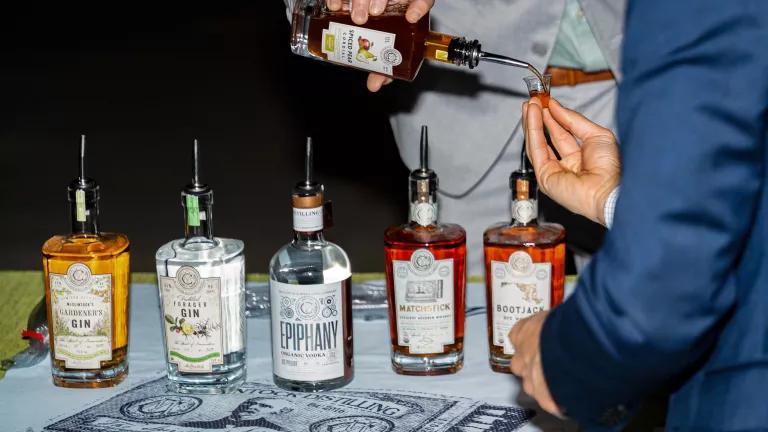Farm-to-Glass Supports Organic Farming
Cheers! NRDC and our partners toasted a good cause on Capitol Hill: growing organic!

Organic spirits tasting at Cheers to Organic 2023
Images by Christiani
This week on Capitol Hill, NRDC, the Organic Trade Association (OTA), and the Swette Center for Sustainable Food Systems at Arizona State University (ASU) - in collaboration with Representatives Pingree, Panetta, and Chavez-DeRemer - brought together over 100 people to toast a good cause: organic agriculture!
Organic farmers use a variety of crops and animals to build healthy soil and deter pests and pathogens, using environmentally friendly practices and limiting the use of chemicals. The growing organic farm-to-glass sector offers farmers new market opportunities and meets consumer demand for climate-friendly food – even at the bar.

Policy Advisor Chelsea Zissman, Representative Chellie Pingree (ME-01), Swette Center Senior Fellow Catherine Greene, and USDA Marketing & Regulatory Programs Under Secretary Jenny Lester Moffitt applaud organic beverage producers
Images by Christiani
Mixer attendees heard from Representative Chellie Pingree (ME-01), U.S. Department of Agriculture’s (USDA) Marketing and Regulatory Programs Under Secretary Jenny Lester Moffitt, and the Swette Center's Senior Fellow Catherine Greene.
Rep. Pingree expressed gratitude to NRDC, OTA, and ASU’s Swette Center for putting on this event to educate members and staff on the benefits of organic, and she highlighted the critical role of public investments. "As an organic farmer myself, I’m a strong supporter of how food is grown under organic standards. Organic helps support soil health and biodiversity, protects natural resources, ensures the humane treatment of animals, and more. As we debate the next Farm Bill and fiscal year 2024 appropriations, it’s critical that we bolster resources for organic agriculture.”
Under Secretary Moffitt spoke to innovative investments in organic that the Biden-Harris Administration has made through USDA's Organic Transition Initiative. Just a year into the launch of the $300 million Initiative, a diverse array of organizations and resources are building momentum to grow organic in every state.
A portion of the Organic Transition Initiative focuses on expanding markets for domestic organic grains, legumes, and other rotational crops – and for good reason. Oilseeds and grains cover about a third of U.S. farmland. Shifting this acreage toward organic management could dramatically reshape our farming landscape.
Rotating through a variety of crops on a farm is essential for maintaining and improving soil health and increasing soil biodiversity. Farms with diversified crops also face lower risk in times of unpredictable weather - even if some plantings struggle due to too much or too little rain, others may do quite well. Crop rotation is also required for organic certification. But in order for the complex crop rotations that make organic farms successful to also make financial sense, farmers need markets for less mainstream commodities like oats, spelt, millet, rye, flax, and lentils, as well as tools to grow more domestic organic wheat and barley. That’s where creative brewers and distillers have a key role to play.
The wine sector also continues to grow, and wine made with organic grapes offers significant protection for vulnerable ecosystems and health in farming communities. California alone had 625,000 acres of wine grapes in 2020, but only about 25,000 acres of harvested organic wine grapes. Like commodity crops, nonorganic vineyards are routinely treated with pesticides, including glyphosate, which has been found in wine, and chlorpyrifos, which remains on the market even though it has been found harmful to human health. Transitioning vineyards to organic keeps those chemicals out of our water, air, soil, and bodies.
There are already over 200 certified organic breweries, wineries, and distilleries active in 27 U.S. states, and many more source ingredients from organic and transitioning farms. With flexible funding and organic-relevant technical assistance and research – including the resources proposed in the Opportunities in Organic Act – we could see organic beverages in every liquor cabinet and on every drink menu in the country.
The following leaders in the organic beverage industry helped us toast the spirit(s) of organic and show us what’s possible for this growing sector.

Ann and Kevin Thomas serve Western Reserve Distillers organic spirits
Images by Christiani
When Ann and Kevin Thomas started their organic distillery, Western Reserve Distillers, they did it with their grandchildren and wildlife in mind. They wanted to protect children from exposure to harmful pesticides, and Kevin, an avid hunter and fisherman, knew that organic farming helps keep our waterways clean. In 2018, after working closely with the Ohio Ecological Food and Farm Association (a partner in USDA’s Organic Transition Initiative with a longstanding organic transition program focused on grain), they launched their organic corn vodka and have since expanded to 23 products, most of which are certified organic. They source all their organic grains – including the organic spelt used in the vodka and gin they served up on the Hill – from Dean McIlvaine’s Twin Parks Organic Farm in West Salem, Ohio. They also use organic molasses from the Louisiana Delta in their organic rum and make their own organic agave spirits.

Braeden Bumpers displays McClintock Distilling organic spirits
Images by Christiani
Braeden Bumpers and his partners at McClintock Distilling have created organic opportunities for farmers and new organic brands alike. Agriculture is the top industry in Frederick County, Maryland, and McClintock has collaborated with the Maryland Department of Agriculture and the County to help small, family-owned farms create value-added products. They produce organic gins, vodkas, and whiskeys, and turn the leftovers into a waste-neutral fourth product line – fruit cordials and liqueurs. In addition, as the first organic spirits co-packer in the country, McClintock puts organic distilling in reach for smaller companies that aren’t ready to build their own facilities. One of their newest customers, Anytime Foods, sources organic wheat from Rosie Kissel’s Breathe Deep Farm in New York’s Hudson Valley, and McClintock transforms it into Farm House organic vodka and gin. Anytime’s founders, Taylor Lanzet and Maddy Rotman, are also working to get their recently launched “farm-to-can” line of canned spritzes certified organic.

Taylor Lanzet displays Anytime Foods organic spirits
Images by Christiani

KOVAL
As the first distillery to open in Chicago since the mid-1800s, KOVAL is one of a growing web of organic alcohol producers in Illinois sourcing organic grains in the Midwest. The founders, Drs. Sonat and Robert Birnecker, use a variety of organic grains important to complex crop rotations, including millet and oats. KOVAL and other brewers and distillers in the Illinois landscape, like Old Bakery Beer Company and Silver Tree Beer & Spirits, are building markets for resilient agriculture.

Journeyman Distillery organic spirits
Images by Christiani
Bill Welter transformed an 1800’s corset and buggy whip factory into Journeyman Distilling, which serves up Michigan terroir in a range of organic whiskeys and other spirits. Now Journeyman is breathing new life into a second location: a former windshield wiper factory in Indiana that has begun to host special events and will eventually be home to a distillery, brewery, and restaurants.

Bonterra Organic Estates Cabernet Sauvignon made from organic grapes
Images by Christiani
Based in Mendocino County, California, Bonterra Organic Estates has made wine from organic grapes for over three decades. The Fetzer family began farming organic fruits and vegetables in the late 1980s and launched Bonterra in 1993. The company has helped numerous farms transition to organic, and they continue to grow their impact.
Peak Organic Brewing grew out of a homebrewing hobby and a passion for sourcing organic ingredients. Today, Peak sources organic grains throughout the Northeast and has supported development of a domestic organic hops sector. They estimate that they help keep 205,775 lbs (93.45 tons) of toxic persistent pesticides and chemicals off the soil every year.

Organic snacks, including generous contributions of BBQ almonds from Burroughs Family Farms, Kalamata olives from Big Picture Foods, and cheddar snacks from General Mills; we’re also grateful to Dr. Bronner’s for contributing organic chocolate
Images by Christiani
Building Supply Chains to Meet Consumer Demand
Across the country, farms are hurting financially. USDA estimated that median farm household income dropped to into the negative digits (-$849) in 2022 and forecast further declines for 2023, forcing many farmers to rely even more heavily on off-farm income. In contrast, organic agriculture continues to grow year over year and has been shown to generate prosperity in farming communities. The alcohol sector stands ready as a valuable market that could drive significant shifts in the way we farm – but organic needs a fair share of our public investments in agriculture to live up to its full potential.
The Opportunities in Organic Act, which was introduced in both the Senate and the House in May, would build on the USDA Organic Transition Initiative with funding to reduce barriers to organic and expand organic supply chains. The buzz about organic is growing, and Congress needs to do its part to respond.




